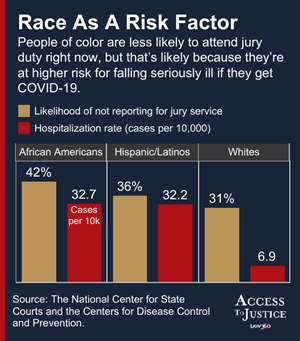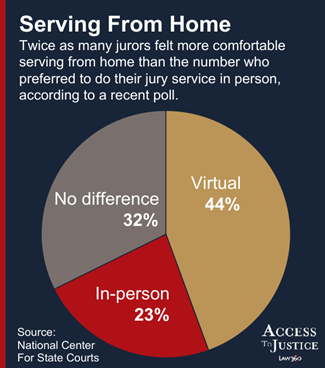Representative Juries
Since the onset of the COVID-19 pandemic, court administrators have faced increasing challenges to ensuring that juries are representative, allowing for a fair and impartial trial.
Jump to: Additional Resources
Even before the onset of the COVID-19 pandemic, courthouses across the country struggled to ensure that their jury pools were adequately representative of their local communities.
Learn more about representative juries
The pandemic’s disproportionate impact on communities of color, elderly and lower-income individuals, and those with predisposed health conditions have only exacerbated these issues.
With Black and Hispanic/Latinx individuals at higher risk for falling seriously ill from COVID-19, these populations have become less likely to participate in juries. In June, a survey by the National Center for State Courts (NCSC) of 1000 respondents found that 64% of Latino respondents and 58% of Black respondents said they'd report for jury duty, compared to 69% of whites.
Similarly, jury engagement among senior citizens, who are most at risk for severe COVID-19 symptoms, has also declined during the pandemic. While 74% of people under 50 said they would report for jury duty, that percentage dropped to 53% for those over the age of 65.
Given these trends, young white men have become the most likely group of individuals to show up for jury duty.
A similar study by the Dispute Dynamics, also found political leanings to be a factor in showing up for jury duty during the pandemic. After polling 281 Pennsylvania residents, 60% of Republicans said they would show up for jury duty, compared to 45% of Democrats.
To adapt to heightened anxiety surrounding jury trials and in-person events, some states established automatically excusals for COVID specific factors such as falling under a higher risk category or having direct contact with individuals carrying the virus (e.g. Massachusetts: Emergency Amendment to Jury Plan). Others have opted to informally excuse prospective jurors who express concerns related to COVID, including, age or having a high-risk condition, a need to supervise young children doing remote school, or general anxiety over attending an in-person event.
With in-person trials presenting a health risk to those involved, virtual trials raise different concerns. On one hand, by allowing jurors to participate from their homes, the process becomes more accessible, eliminating the need for transportation to and from the court. However, virtual trials do require access to reliable broadband, and a Zoom-compatible device, both of which correlate with financial means. A 2019 study by Pew Research found that 29% of adults with household incomes below $30,000 a year don’t own a smartphone, 44% don’t have access to home broadband, and 46% don’t have a traditional computer. With Native Americans (25.4%), Black (20.8%), and Hispanic individuals (17.6%) roughly twice as likely to live in poverty as white individuals (10.1%), the technology gap only exacerbates existing racial disparities. Nevertheless, NCSC found that twice as many jurors felt more comfortable with virtual proceedings than in-person ones.
As vaccine rollout continues, these demographics are likely to shift. Individuals who are vaccinated, particularly at-risk individuals, may become more comfortable taking part in an in-person jury trial. Despite this, the systemic issue of unrepresentative jury populations remains – with COVID-19 merely bringing to light the existing inequities in an unjust system.
ADDITIONAL RESOURCES
The Practical and Constitutional Issues with Virtual Jury Trials in Criminal Cases (ABA, February 26th, 2021)
Constitutional Concerns Related to Jury Trials During the COVID-19 Pandemic (National Center for State Courts, February 22nd, 2021)
Jury Selection in the Age of COVID-19 (ABA, December 17th, 2020)
Can You Get A Fair Jury Trial During The Pandemic? (Cara Bayles, Law 360, August 30th, 2020)
Jury Trials in a (Post) Pandemic World – National Survey Analysis (National Center for State Courts, June 22nd, 2020)

.png?lang=en-US&width=700&height=305)
